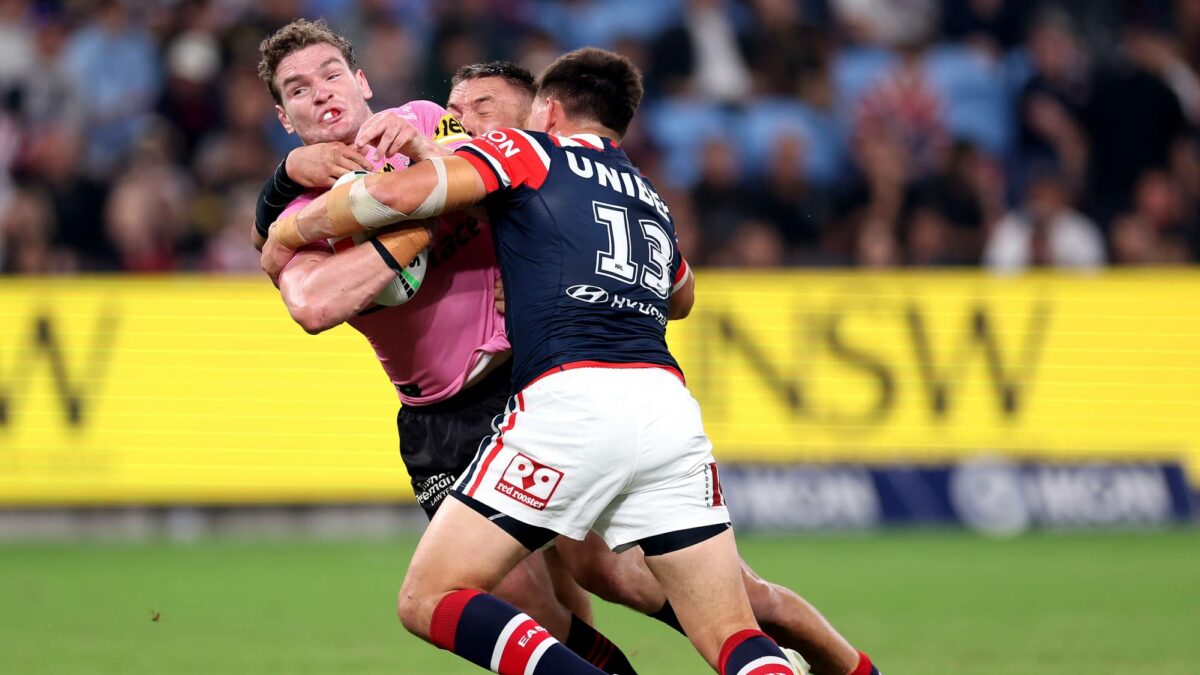Why did we ever doubt them? The Panthers entered this clash as clear outsiders, but sent out the strongest statement yet that the Premiership is theirs to lose with a 22-16 slap down of the Sydney Roosters on their own patch.
It was set up as a changing of the guard, with the Panthers missing Nathan Cleary and James Fisher-Harris against a team that was coming in off the back of a huge derby win a week ago.
Yet this was as one-sided as they come. Don’t let the scoreline fool you: this was a beatdown from the first minute on. Easts were not a factor in the game at all until past the hour mark, by which point the result was well and truly gone.
Sunia Turuva scored a hat trick, completing moves that showed how well the Panthers orchestra, led by Jarome Luai and Isaah Yeo, functions even without Cleary the conductor.
Dylan Edwards was lead soloist for his try, one of the individual efforts of the year, but happy to do his bit for the collective too.
There was even space for a Mavrik, with Mark Geyer’s young bloke, roared on by an entire stadium bay of well-wishers, getting an NRL debut in the second half.
Liam Martin exemplified the commitment, going off with an AC joint issue in the first half but returning in the second to do a stint in the middle despite obvious pain.
Trent Robinson could see what was happening in real time, but was powerless to stop it. The Roosters were trapped in their own end, burning energy but spinning their wheels.
It might have been different had an early Bunker call not cruelled Joey Manu out of an individual effort of his own, with the video finding an obstruction by Jared Waerea-Hargreaves on Edwards where the 301-game veteran was a solid 10m through the line and 20m from the ball.
It was tough, but so was everything tonight. It didn’t go close to deciding the result: Penrith did, and underlined how serious they are about a fourth Premiership in the process.
Players change, but systems don’t
Why did we ever doubt them? The Panthers can lose talent left, right and centre but their collective is so strong that it makes not a jot of difference.
Penrith came knowing exactly what they wanted to do – spoiler alert: it’s what they always do – and then did it perhaps better than they ever have.
It’s a big claim, but this was a team without Cleary and Fisher-Harris, the two biggest drivers of standards, away at one of the best teams in the comp.
The first half stats told all the story. Both sides have roughly the same amount of ball – 20 sets to 19 in favour of the visitors – but where they had them mattered massively.
71% of the game had been played at the Paddington end, with the back three of the Roosters absolutely unable to get any traction to move their side up the field.
Penrith were averaging just a shade over 50m per set, Easts just 27. That’s not a misprint: each Panthers set was worth twice as many as a Roosters equivalent.
There were moments of brilliance from both Luai and, especially, Edwards, but it was the way the whole defence constricted around the Chooks in the first half that made the chances for the more creative players to shine.
Brad Schneider knew he didn’t have to be Cleary and instead let Luai take the lead creatively, but when it came to finishing sets, he butted in and called the shots.
Dom Young was battered. He didn’t make mistakes, as he sometimes can, but was unable to make any head of steam. He caught the ball and got nailed, over and over.
In attack, we saw the same. Schneider knew where his part was in proceedings, and the trio of Luai, Edwards and Yeo did the rest. Turuva, on the wing, only needed to put the ball down.
The Chooks left standing still
The messaging from Robinson at the break was about bodies in motion. He wasn’t wrong.
As much as the Panthers defence was great, they were able to load up due to the lack of deception in the Roosters’ attack, which was very one out at times.
There’s nothing wrong with taking hard hit-ups and, when you’re starting deep in your own end, it’s often the only option.
But if you don’t run the supports, then the opposition knows you’re not going to pass it and can fly into tackles with ease.
When the Chooks shifted early they did get a little joy, but that’s not sustainable early on against the Panthers.
The way out of the strangle is to get men moving, which introduces doubt into the minds of defenders, which helps limit the number of bodies in the tackle, which helps win rucks and you go from there.
Beyond that, Easts didn’t actually do that much wrong. They didn’t concede a line break until the second half.
They completed at 74%, which isn’t ideal when your opponent is up in the 90s but isn’t in and of itself a bad thing.
The difference was the yardage. They were always playing out, which magnifies errors, and induces conservative play. That isn’t a bad thing, but if it doesn’t come with at least the threat of a pass, it’s one out.
